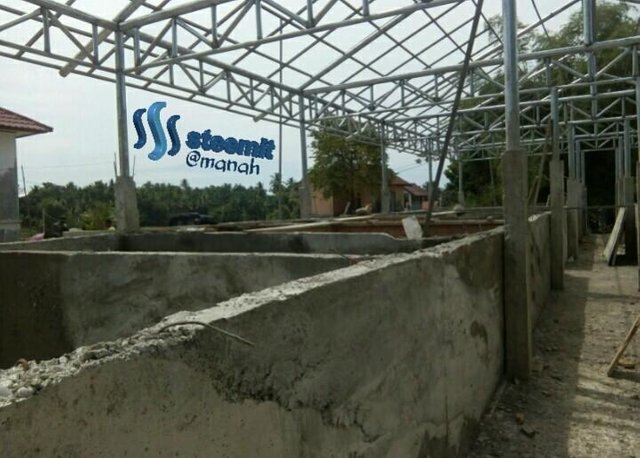In the construction world, concrete is a composite building material made from a combination of aggregates and cement binders. The most common form of concrete is Portland cement concrete, which consists of mineral aggregates (usually gravel and sand), cement and water.

It is usually believed that the concrete dries after mixing and laying. Actually, the concrete does not become solid because the water evaporates, but the cement hydrates, glues the other components together and ends up forming hard materials like rocks. Concrete is used in making road pavement, building structure, foundation, road, pedestrian bridge, parking structure, base for fence / gate, and cement in brick or block wall.
Today almost every building in the world uses concrete as its component structure. The concrete has a very good load resistance. But before discussing the concrete further, we must know in advance what is concrete understanding.
Concrete is a mixture of aqueous, cement and aggregate material or in addition addictive to a predetermined amount of content. Concrete will have a very high strength after hardening or reaching the age of concrete strength.
The architects also often make very high building artwork, with the use of concrete as its construction material. In addition, if made of reinforced concrete it will produce a good kekutan against tensile and press forces.
In development, the concrete is now being modified to a lot better like lightweight concrete, spray concrete, fiber concrete, and others, so its use becomes very massive around the world.
But in the use of concrete as a construction material, of course there are several advantages and disadvantages.

The Advantages Of Concrete In The Construction Of Buildings Include:
- Concrete has resistance to fire.
- The cost of concrete treatment is relatively cheaper.
- Fresh concrete can be formed as desired.
- Concrete prices are relatively cheap and can be processed from local materials, except portland cement.
- Have a good resistance to the press load.
- Fresh concrete can be transported and transported with tools, very easy.
- Concrete can be formed into high artwork, if done according to good art.

Concrete Deficiencies In Building Construction Include:
- It has no resistance to attractiveness or easy cracking, so it is necessary to use reinforcing steel on concrete.
- Concrete can not be impermeable.
- Concrete will shrink and expand when temperature changes occur.
- Concrete has a heavy weight and causes a very heavy burden.
- Need good and perfect planning, if plotting a reinforced concrete structure.

Thus the discussion of the civil engineering world on the understanding, advantages and disadvantages that exist in the concrete. Hopefully useful for me and for those who read.
By @manah

Congratulations! This post has been upvoted from the communal account, @minnowsupport, by manah from the Minnow Support Project. It's a witness project run by aggroed, ausbitbank, teamsteem, theprophet0, someguy123, neoxian, followbtcnews/crimsonclad, and netuoso. The goal is to help Steemit grow by supporting Minnows and creating a social network. Please find us in the Peace, Abundance, and Liberty Network (PALnet) Discord Channel. It's a completely public and open space to all members of the Steemit community who voluntarily choose to be there.
Downvoting a post can decrease pending rewards and make it less visible. Common reasons:
Submit
Understanding the advantages and disadvantages of concrete in building construction is essential for informed decision-making in the architectural realm. Concrete, renowned for its durability and versatility, serves as a fundamental building material. Its compressive strength and ability to withstand various environmental conditions make it a popular choice. However, its heaviness and susceptibility to cracking are aspects that demand careful consideration. Daytona beach foundation contractors, with their specialized expertise, play a crucial role in navigating these factors. Collaborating with skilled professionals ensures that the advantages of concrete are maximized while addressing potential challenges. The knowledge and experience of Daytona Beach foundation contractors become invaluable in achieving structural integrity and longevity, contributing to the successful realization of robust and enduring construction projects.
Downvoting a post can decrease pending rewards and make it less visible. Common reasons:
Submit